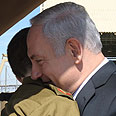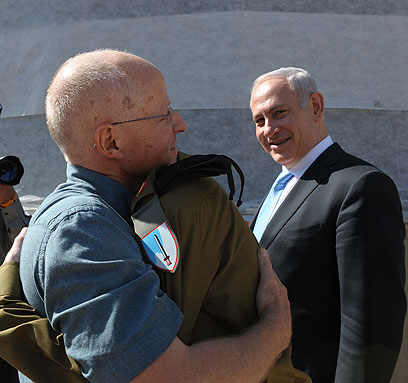
NYT: Netanyahu says yes to Hamas, no to Fatah
Editorial suggests Shalit prisoner exchange will weaken Abbas while Spain's El Pais claims 'Palestinian Authority's moderate stance failed to move Israeli government'
WASHINGTON – The New York Times is once again criticizing Prime Minister Benjamin Netanyahu, this time over his refusal to compromise in his negotiations with the Palestinian Authority and his willingness to sign an agreement with Hamas.
"As for Netanyahu, we saw on Tuesday that the problem is not that he can’t compromise and make tough choices. It’s that he won’t. That won’t make Israel safer," a New York Times editorial piece stated.

Netanyahu looks on as Gilad Shalit hugs his father (Photo: GPO)
The editorial then questioned claims made by Netanyahu's backers over the supposed weakness of the coalition in Israel: "Netanyahu’s backers claim that his coalition is so fragile that he can’t make the compromises needed to help revive peace negotiations.
- For full coverage of the Shalit homecoming, click here
"But he was strong enough to go against the grief-stricken families of those Israelis killed by the Palestinian prisoners he just freed. Why can’t he make a similarly impassioned appeal for a settlement freeze for the sake of Israel’s security?"
The paper also expressed concern that the deal with Hamas could further impede the peace process with the Palestinian Authority. "We are already concerned that the deal will further thwart an Israeli-Palestinian peace agreement, the only real guarantee of lasting security for both sides."
According to the author of the editorial: "Now that Prime Minister Benjamin Netanyahu of Israel has compromised with Hamas, we fear that to prove his toughness he will be even less willing to make the necessary compromises to restart negotiations. And we fear that the Palestinian president, Mahmoud Abbas, and his Fatah faction, who were cut out of the swap altogether, will be further weakened."

Hamas rules? Celebrations in Gaza (Photo: EPA)
The New York Times concluded that "Netanyahu and Hamas were looking for a political win after Mr. Abbas grabbed the international spotlight — and saw his popularity soar — when he asked the United Nations last month to grant his undefined country full membership."
The paper also accused Netanyahu of having double standards: "Netanyahu twisted himself in an ideological knot to get this deal. Only five months ago, he wanted to cut off tax remittances to the Palestinian Authority and urged the United States to halt aid because Abbas tried to forge a unity government with Hamas, which controls Gaza.
'Incredible deal'
"If Netanyahu can negotiate with Hamas — which shoots rockets at Israel, refuses to recognize Israel’s existence and, on Tuesday, vowed to take even more hostages — why won’t he negotiate seriously with the Palestinian Authority, which Israel relies on to help keep the peace in the West Bank?," the paper asks.
The editorial in Spain's El Pais newspaper was also less than complementary towards Netanyahu.
"The clear result of the swap is not positive. While the Palestinian Authority led by Mahmoud Abbas has not been able to make Israel put a stop to settlements in the occupied territories, a completely reasonable condition for renewing the talks, Hamas has obtained an incredible deal even though Marwan Barghouti was not among the released prisoners."
"The resulting outcome is clear: The Palestinian Authority's moderate stance failed to move the Israeli government while force – the kidnapping of Gilad Shalit – did: 1,000 for 1."
- Follow Ynetnews on Facebook
- Receive Ynetnews updates directly to your desktop










